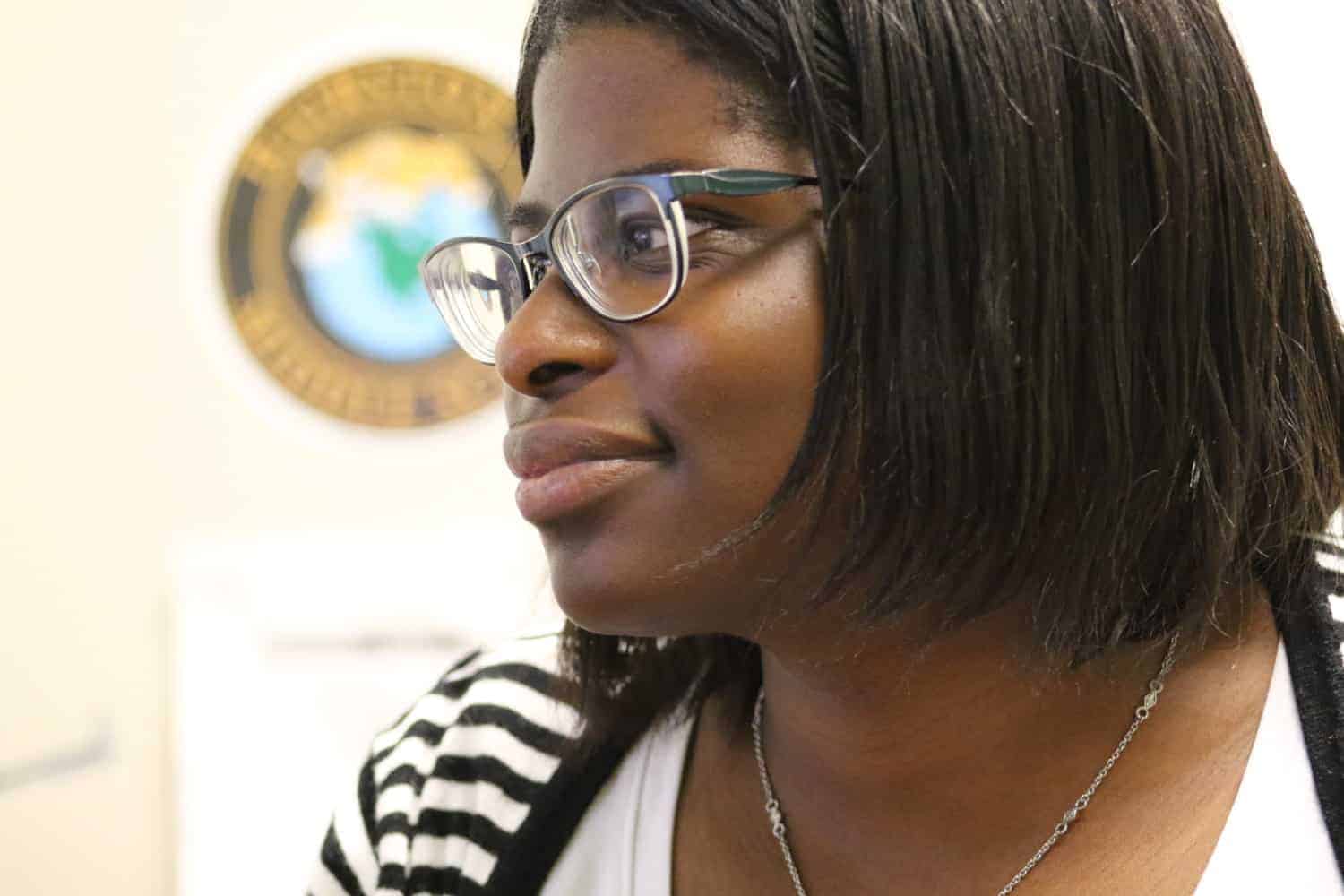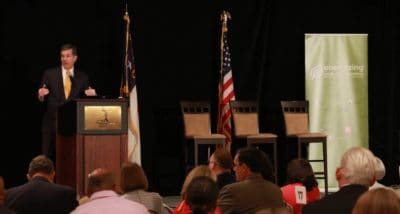The first 12-person high school class Glasher Robinson taught included a recent mother, a pregnant student, two recovering drug addicts, and two children with special needs. Teaching biology and chemistry at the Middle College, a High Point high school for “children whose needs were not met in a traditional school setting,” Robinson said, gave her experiences she carries with her as an assistant principal today.
A recent graduate from High Point University’s Leadership Academy, an administrative preparation program focusing on developing leaders of high-needs schools, Robinson has worked at Guilford County’s Hairston Middle School, known as “The Hairston,” since November. She was officially hired as an assistant principal last December.
Robinson has a specific passion for educating students who, like her first students at the Middle College, face academic and socioeconomic challenges. When The Hairston’s current rising eighth graders came into middle school, only 14 percent were on grade-level, Robinson said. Ninety percent of students at The Hairston live below the federal poverty line.
“It definitely feels like I’m here because I’m supposed to be here, and this is what I’m supposed to be doing,” she said. “I think that is the absolute best part about being here at The Hairston: we are at a school where our students need us.”
To support students who are behind grade level, teachers need extra support. Robinson said she is still switching from a teaching lens to an administrative one. The lingering teacher in her helps her understand teachers’ needs in the classroom. For example, she said she remembers many of her Middle College students struggling with basic reading skills. As a student studying secondary science education, Robinson did not learn how to teach kids how to read.
“That’s one of the difficulties of teaching in high-impact schools,” Robinson said. “Even having had the education background coming from undergrad … some of the level of reading skills that elementary teachers get, secondary teachers really do need. I really had no clue going into high school that students really could not read.”
Robinson said she wants to help teachers identify those weaknesses and seek meaningful opportunities — both big and small — to better themselves. When she was a science teacher, Robinson applied for a $250 grant. It was her first time writing a grant proposal. To her surprise, she got the grant, and used the money to buy a fire safety blanket for her classroom.
Robinson said she is excited about “helping our teachers understand how to tell the story for what your need is, and why you need this money, and what is it going to do, what is your expectation.”
Robinson knows professional development. While teaching, she earned her master’s degree in science education from Georgia State University, was part of the N.C. Science Leadership Association cohort in 2014, participated in the National Institute for Environmental Health Science externship in 2016, was a leadership fellow in the National Education Association’s local branch the same year, and was planning to get her doctoral degree in science education when High Point’s academy application dropped into her inbox.
“I’m very much an opportunistic person,” Robinson said. She said these experiences appeal to her constant desire to grow and try new things. Yet another program, N.C. State University’s Science House, completely changed her teaching style and helped her teach chemistry — a subject she never liked — in a more effective way.
“All of the wonderful things I got to do as a teacher, I want to help our teachers do that.”
The upcoming year has a lot in store for Robinson. She is adjusting to wearing a number of hats at once. As one of three assistant principals, Robinson handles discipline needs for her grade. She is in charge of facilities, which means coordinating any use of the building, managing the custodial staff, and overseeing alarms and drills. She also is taking on Title I paperwork without any formal training. She is tasked with providing evidence of how the federal funds are used. On top of all of that, she wants to be in classrooms more regularly, focusing on bettering teacher instruction.
Robinson said she is learning how to use distributive leadership, a skill she learned at High Point’s academy, to balance it all.
“Even as a leader, you can’t do it all,” she said. “You have to have an understanding of what your vision is, and who do you need to help you executive that vision, and when I say, ‘who,’ you should need everybody, but which roles are people going to play?”
Robinson said she would like to eventually be a principal but does not yet feel ready. At a school that struggles to retain high-quality teachers and administrators, she said she wants to stay at least until the students she oversees, who are now in seventh grade, finish high school.
“I’m in no rush at all to be a principal,” she said. “I think what I do have an awareness of is, being here at The Hairston, with all we do, I feel comfortable that once I leave here, at whatever point I choose to, I could go to any school and be OK.”
The Hairston is implementing school-wide changes in the upcoming school year which makes Robinson both excited and nervous. Because of continuing low academic performance, the school has received a “restart” status from the state, which gives the school charter-like flexibility in scheduling, curriculum, and staffing. The school is also trying out opportunity culture for the first time — a restructuring of scheduling and staff roles that allows highly-effective teachers to have more responsibility and reach more students. Robinson will work closely with the science multi-classroom leader to assess data and have constant conversations on how to improve student outcomes.
“There is an expectation that there will be increases in proficiency rates as well as growth next year,” she said. “So we are ready for that challenge. We are up to that challenge. We are ready to have people understand that we do have some difficulties that we face, but we’re not shying away from that. We’re prepared to show you a different story.”



